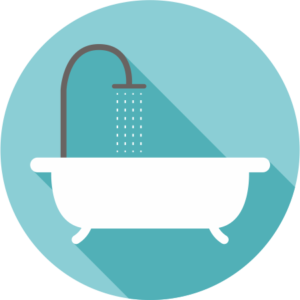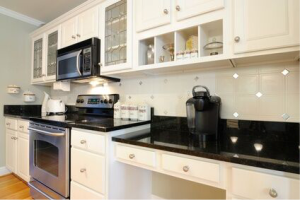Bathroom Care Guide
Keep your bathroom sparkling for longer
Written on December 16, 2016
It doesn’t take much for that post-cleaning sparkle to disappear from a bathroom in a typical family  home.
home.
Within just a few days, it can quickly become one of the least glamorous parts of the house, so that’s why it’s essential to keep on top of bathroom cleaning and maintenance to have the room always looking its best.
However, while most people recognise the importance of regularly cleaning their bathrooms, many homeowners overlook the maintenance requirements involved.
Regularly checking your bathroom for common problems, such as leaking plumbing, poor ventilation and mould, will help to prevent a costly problem arising later on.
Key Points
It is imperative to keep your bathroom well ventilated.
Pay special attention to grout lines when giving your bathroom a deep clean, since they can be susceptible to mould.
There is a simple way to unblock drains without resorting to strong chemicals.
If the flow of water from any taps in your bathroom or kitchen is inadequate, then limescale is by far the most likely culprit.
Remodelling your bathroom can add value to your home…
You can easily compare quotes using our Find a Tradesman service
Dealing With Leaks and Condensation
Since bathrooms deal with a lot of moisture, it’s imperative that they are suitably ventilated. Bathrooms that are not properly ventilated will remain humid long after showering or bathing, making for a much more inviting environment for household mould.
Mould presents a whole raft of problems, including greatly reduced indoor air quality but, even more importantly, it invariably points to a more serious problem.
In the case of bathrooms, mould is almost always a result of
- poor ventilation or
- leaking plumbing fixtures
For this reason, you should regularly check for damp patches pointing to leaks in hard-to-reach places, such as beneath shower trays or baths.
Many leaks are easy to fix, and may be sorted out by a plumber in a matter of minutes. A lot of leaks are caused by loose plumbing fixtures, such as drain connections or failing taps.
However, more serious leaks may be a result of a crack in the bathtub or shower tray which, unfortunately, usually means that the entire unit will need to be replaced.
Fortunately, most damp-related problems in bathrooms are entirely a result of poor ventilation, which is easy enough to fix provided you tend to it quickly.
Most importantly, you should ensure that your bathroom meets UK building regulations, not just because of legal concerns, but also because they provide a minimum requirement for bathroom ventilation.
Most bathrooms are required to have an extractor fan installed, which should be repaired as soon as possible if ever it breaks down.
If your bathroom has a window, you should keep it open a crack whenever bathing or showering and for a short while afterwards, since it will help to remove steam from the room, thus preventing mould from building up.
No bathroom should ever be kept completely closed up, especially when it’s in use. You should also avoid leaving damp towels in bathrooms, instead leaving them outside or in a well-ventilated room to dry out properly.
Repairing Grout & Sealant
Tiled surfaces, such as those in the typical bathroom, need to be grouted to prevent moisture from getting in between the tiles and damaging the wall beneath or the adhesive that keeps the tiles attached.
You should also pay special attention to grout lines when giving your bathroom a deep clean, since they can be susceptible to mould. On occasion, however, you will need to repair grout using a caulking gun, suitable ceramic tile grout and scraping tool.
When repairing bathroom grout, here’s what you should do
- You’ll first need to scrape out the existing grout and thoroughly clean away any remaining residue. If the surfaces are not completely clean, the new grout won’t adhere properly.
- Once the surface is prepared, load up a caulking gun with grout and apply it to the gap.
- Afterwards, wipe away any excess grout from the surface using a damp cloth, and leave it to dry.
Although most products will be dry to the touch within half an hour, you should wait at least 24 hours before using the bathroom to ensure that the material has fully settled and has reached its optimal performance level.
You should also regularly check the state of any caulk around shower trays and bathtubs to ensure that there’s no place for water to get into otherwise hard-to-reach areas.
Maintaining Shower Doors
Shower doors, whether they slide or swing, need to be inspected regularly to ensure optimal performance.
If there is any standing water left behind after having a shower, either
- the drainage system in the door track has failed
- the seal has come loose
- or of course, there’s also the possibility that the door wasn’t closed during showering, so be sure to take this into account before assuming something is broken.
If the seal around the edges of the shower door or frame is damaged, it can usually be replaced without having to replace the door itself or the entire unit.
Unblocking Drains
There are few things worse than blocked bathroom drains and plumbing backups, but they’re inevitable on occasion. Fortunately, there’s rarely any need to call a plumber if you have a blocked drain, unless you’ve tried all the DIY fixes and the problem keeps recurring.
Drains will clog up on occasion, particularly if you don’t install protective meshes around plug holes to filter out larger amounts of detritus.
One of the most effective ways to unblock drains without resorting to strong chemicals is to use a combination of baking soda, vinegar and boiling water.
- Start by tipping a pot of boiling water down the drain before tipping about half a cup of baking soda into the plug hole.
- Next, pour a mixture of half vinegar and half boiling water down the drain, cover the plug and wait for around ten minutes.
- Finally, flush another pot of boiling water down the drain, and it should get unblocked.
This method should solve most blockages, and it’s worth trying before you try a more heavy-duty drain unblocker.
Fixing Blocked Taps
A common problem in many households is limescale, particularly in areas with hard water.
While having a water softener installed will help prevent the build-up of limescale, there will usually be one tap not connected to the system for the sake of providing suitable drinking water.
If the flow of water from any taps in your bathroom or kitchen is inadequate, then limescale is by far the most likely culprit.
The best way to solve the problem involves removing the tap or blocked pipe and immersing it in water with a high concentration of lemon juice or other light acid.
The acid will usually dissolve the limescale within about fifteen minutes, after which you can reconnect the fixture, and it should once again work flawlessly.
Cleaning Your Bathroom
Cleaning the bathroom at least once per week may be standard procedure for any self-respecting homeowner, but there are certain things that tend to get overlooked, such as hard-to-reach places beneath fittings, the underside of taps, plug holes and stoppers.
An all-purpose bathroom-cleaning product will be fine for everyday cleaning as well as the occasional deep cleaning.
You should avoid using particularly course scrubbing brushes on tiled surfaces, however, since doing so may cause damage to the grout.
When giving your bathroom a deep clean, be sure to pay attention to any mould around plug holes and other often overlooked areas.
If you have a shower curtain, you will also need to clean or replace it every few months or whenever it starts showing signs of discolouration due to mould.
After cleaning, always leave the bathroom door open and keep it well ventilated until it’s completely dry.
Bathroom Remodelling
Despite being one of the most important and frequently used areas of a home, bathrooms are rarely a glamorous affair and, as such, they tend to be among the last rooms to get a major facelift.
However, remodelling your bathroom can add value to your home while also greatly improving functionality and comfort.
Things like larger shower cubicles, new lighting fixtures and anything that makes better use of what is often a limited space are all popular bathroom remodelling projects.
In other cases, remodelling a bathroom simply makes sense, particularly when problems such as drain blockages and leakages start occurring on a regular basis.
According to which.co.uk, the average cost of fitting a new basin, toilet and bath is around £365 in addition, of course, to the actual cost of the bathroom furniture itself.
Nonetheless, if your bathroom hasn’t had a major facelift for about twenty years or more, then a carefully planned upgrade will very likely recuperate the costs in terms of what it adds to the value of your home.
And Finally…
Bathroom cleaning and maintenance might not be the most glamorous of household tasks, but a lack of a proper routine can lead to future damage that can be costly to repair.
For most households, a light clean at least once per week, combined with a deep clean every month, along with an inspection for any leaks or damages, should help to keep the plumber away for quite some time.
However, if your bathroom does develop a leak, particularly in a hard-to-reach area, you shouldn’t hold off from calling a plumber.
By using our Find a Tradesman service, you can find a reputable plumber in minimal time by viewing ratings and references on our website.
This information is for general purposes only, does not constitute legal, financial or professional advice and should not be relied on or treated as a substitute for specific advice relevant to particular circumstances.
Key Points
It is imperative to keep your bathroom well ventilated.
Pay special attention to grout lines when giving your bathroom a deep clean, since they can be susceptible to mould.
There is a simple way to unblock drains without resorting to strong chemicals.
If the flow of water from any taps in your bathroom or kitchen is inadequate, then limescale is by far the most likely culprit.
Remodelling your bathroom can add value to your home…
You can easily compare quotes using our Find a Tradesman service

Other Pages You May Like
With our simple to use Kitchen Care Guide, you can keep your kitchen sparkling for longer.
Taking care of our roof is one of the most important yet often neglected responsibilities. We have a few ways you can take care of your roof.
Properly planned home improvement can be one of the best investments you will ever make: but can you afford it?



